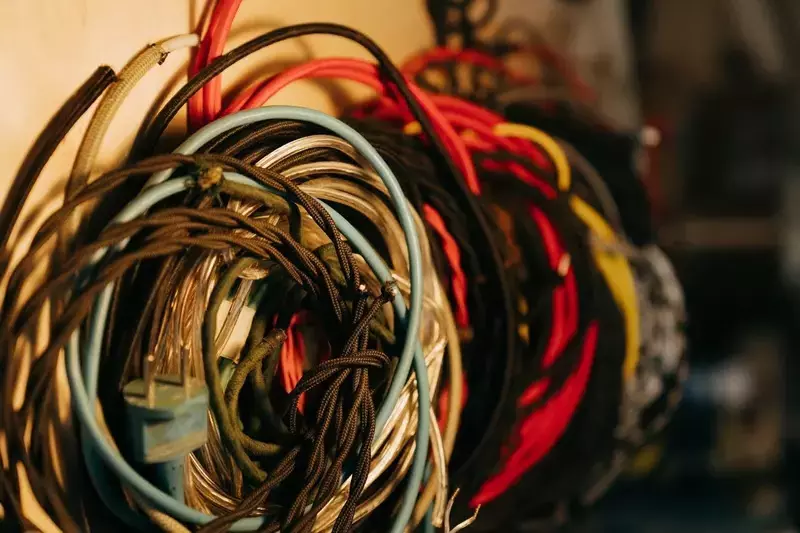Every office has a unique layout. Designers and engineers often choose to place the desks and workstations to provide the most optimal lighting while enabling everyone to move freely. That’s precisely why electrical outlets often end up too far from some desks. It’s something anyone can quickly fix with an extension cord.
The only problem is that there are many different extension cords on the market. They differ in terms of their type, build quality, lengths, and other characteristics. How do you pick the one that suits your office needs the best?
Here is a cheat sheet you can consult anytime you need to buy an extension cord for your offices.
Table of Contents
Switch or not
When you consider whether to buy a switch power cord or not, there are a few things to think about. In some scenarios, an extension cord with a switch is the best solution. For example, if you have many computers and peripheral devices in your offices, it might be a good idea to get one with a switch.
Most of the newest devices don’t shut down. Instead, they are in a sleep mode or hibernation. A power surge can burn the circuits in these expensive devices. There is also a risk of a fire hazard as all of these devices can catch fire due to power surges or accidental circuit breakdowns.
Having a switch enables you to power down all modern electronics in your offices without removing the cord from the plug. It’s a safe and convenient perk to have in the offices. Some switches even feature a light indicator that tells you whether the switch is off or on.
Consider the length
We’ve already mentioned that every office has a unique layout. The best extension cord for someone else doesn’t necessarily mean that it is also the best option for you. One of the most important factors to consider is the length of the cord.
You need to measure the distance between all the power outlets you have in your office and workstations and desks. Then, when you know all the measurements, you can start looking at the extension cord offers.
However, there is one more thing to consider – the length affects the voltage drop. Due to the resistance in the cord wires, you need to think about voltage and voltage loss scales up with the cord length. With this in mind, you should always choose the shortest extension cord possible.
Take the cord gauge into account!
When looking at the length of the extension cord and electrical resistance, you also need to pay attention to the gauge. Every extension cord comes with the American Wire Gauge (AWG) number. It indicates the diameter of the wire in the extension cord, which translates to how much electrical current it can carry.
For instance, if you have two extension cords with the same AWG number but different lengths, the shorter one will have more capacity than the lengthier one. Cables with thicker wires are labeled with a smaller AWG number.
Now that you know what roles switches, cord gauge, and length play, you can start assessing your office needs to choose the best extension cord.
Calculate the maximum draw of electrical power
All extension cords can be divided into three categories based on how much electrical power they need to output. The output value should match the value of electrical power the devices will draw.
You need a light-duty extension cord for desks with only light-duty devices such as phones and lamps. These cords are usually 25 feet long and with 18 AWG, and they can supply electrical power of 7 amps.
Medium-duty extension cords of the same length feature a 16 AWG wire as they need to output ten amps of power. Again, these are ideally suited for computer desks.
Heavy-duty extension cords that are 25 feet long use a 14 AWG wire. They can support electrical devices that draw up to 15 amps of power.
The rule of the thumb is that if you need an extension cord longer than 25 feet, you need to choose a smaller AWG number.
Prevent shock hazards
You should always exercise caution when using extension cords in offices. There are two things you should consider when choosing the best one. All medium and heavy-duty extension cords need to be grounded and plugged into three-slot power outlets. It will help you:
- Protect your devices against electrical overload
- Stabilize voltage levels
- Prevent property and data loss and physical injury
To thwart the risk of shock hazards and fire, you should choose extension cords with built-in GFCI protection. However, before you do that, make sure that you have GFCI-protected power outlets in your offices.
Choosing the best extension cord for offices is very important. You will extend the lifespan of electrical devices and protect your employees from fire hazards and physical injury. Thanks to the tips we’ve shared with you, you will be able to make an informed decision and choose the best extension cords for your office building.
Read Also: Working Ergonomically: 5 Ways to Work Comfortably in the Office




